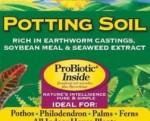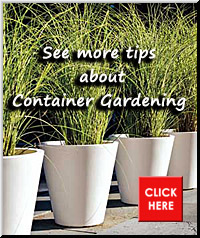 One of the most important factors affecting success with container grown plants is the choice of potting soil. The potting soil should be light weight, provide the roots with air and moisture, and allow the uptake of nutrients. Ordinary garden soil can not fulfill these functions because it is too heavy and does not provide adequate drainage. In addition, garden soil contains weed seeds, fungal spores, insect eggs and many other unwanted material. Specially formulated potting soil mixes try to overcome these problems but what kind of potting soil is best? There are several different kinds of potting mixes available and each has advantages and disadvantages.
One of the most important factors affecting success with container grown plants is the choice of potting soil. The potting soil should be light weight, provide the roots with air and moisture, and allow the uptake of nutrients. Ordinary garden soil can not fulfill these functions because it is too heavy and does not provide adequate drainage. In addition, garden soil contains weed seeds, fungal spores, insect eggs and many other unwanted material. Specially formulated potting soil mixes try to overcome these problems but what kind of potting soil is best? There are several different kinds of potting mixes available and each has advantages and disadvantages.
There are three basic kinds of potting mix.
 Soil-Based Mix
Soil-Based Mix
This mix contains sterilized loam, a substance like perlite or sand to improve drainage, and organic matter such as peat. It will usually include some fertilizer that has to be replenished in three months or so when is has been depleted.
Advantages:
-
-Different blends are made for different plants (i.e. cactus, orchids)
-Good water retention
-Supplies nutrients
Disadvantages:
-
-Heavy
-Variable quality
 Peat-Based Potting Mix
Peat-Based Potting Mix
Also known as soil-less mix, the main component is peat moss. This mix usually contains other materials to improve drainage, fertilizer, and a wetting agent.
Advantages:
-
-Light
-Clean
-Consistent quality
Disadvantages:
-
-Dries out quickly and difficult to rehydrate
-Low nutrient level
-High potential of waterlogging
-May have low pH
-Use of peat contributes to environmental damage
 Peat-Free Potting Mix
Peat-Free Potting Mix
This type of mix is a reaction to the concern for the environment where peat is grown and harvested. The main component of peat-free potting mixes is some sort of organic matter such as coir (coconut fiber), mushroom compost, rice hulls or recycled household waste. Sometimes composted bark is used making the mix unsuitable for use with seeds and seedlings
Advantages:
-
-High nutrient level
-Good water retention
-Free of weed seeds and plant pathogens (due to heat treatment)
Disadvantage:
-
-Variable success with different kinds of plants depending on the type of organic matter used
 Various other additives like lime may be included in any of these soil mixes to make them especially suitable for certain plants. You can add soybean meal, kelp meal, or rock phosphate to enhance nutrient levels so the soil provides nutrients for a year or two. If you have doubts about the soil mixes that are available you can formulate your own using one of many “recipes” available. Decide which of the basic type of soil mixes you want and proceed from there.
Various other additives like lime may be included in any of these soil mixes to make them especially suitable for certain plants. You can add soybean meal, kelp meal, or rock phosphate to enhance nutrient levels so the soil provides nutrients for a year or two. If you have doubts about the soil mixes that are available you can formulate your own using one of many “recipes” available. Decide which of the basic type of soil mixes you want and proceed from there.